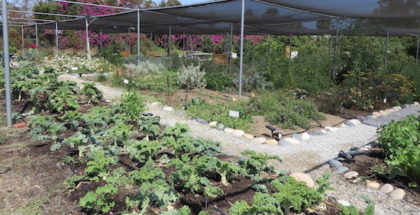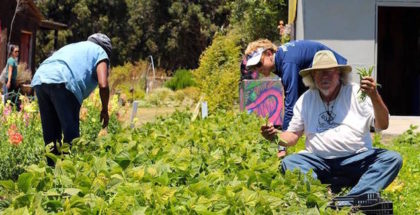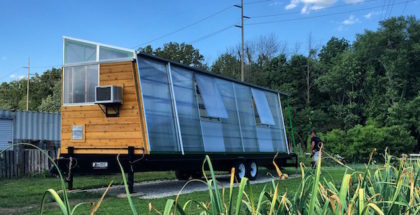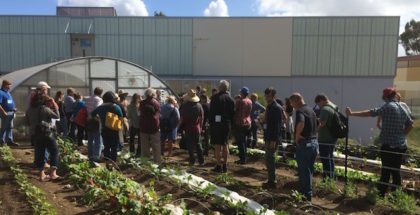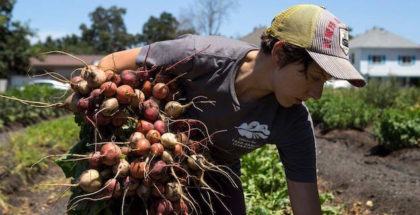Conference News
Vacant Lot Turned Urban Farm Transforms Community, Increases Food Access
January 2, 2017 | Maria Hsin
The Growing Experience (TGE) is a seven-acre urban farm in North Long Beach that is located on a previously vacant lot. Photo Credit: Maria Hsin
On a recent Friday morning, eggs, figs and other vegetables and fruits were being placed on the back of a small truck destined to be sold at a farm stand in the parking lot outside of the Senior housing block in the Carmelitos Public Housing Community in Long Beach, CA. The produce was grown on site at The Growing Experience (TGE), a seven-acre urban farm in North Long Beach that is located on a previously vacant lot that is part of the same housing complex.
The TGE urban farm is unique in that it is owned and operated by the Housing Authority of the County of Los Angeles (HACoLA), which manages 3,229 units of public and other affordable housing for the county’s Public Housing program. Read More
For Homeless in Santa Cruz, CA, Garden Project Offers Hope, Stability, and Jobs
December 26, 2016 | Charli EngelhornTalking about the homeless population of America is popular these days. And yet fixing the situation seems, to many, an impossibly overwhelming task. Others are proving it’s not. The Santa Cruz Homeless Garden Project (HGP) uses sustainable agriculture as the springboard to a safer, productive and more hopeful life for many. The agriculture and gardening training provided to the homeless of Santa Cruz County through the project has culminated in both jobs and permanent housing for its trainees.
“We find people that express much greater degrees of well being after they are with us for a year, whether it’s in their diet, in their sense of self, in their ability to set goals and achieve them, in how connected they feel to the community,” says Darrie Ganzhorn Executive Director of the Homeless Garden Project. Read More
‘Insurgent Architecture’ Students Build Mobile Greenhouse to Overcome Urban Farming Challenges
December 19, 2016 | Karen BrinerIt is believed to be a world first: a fully functioning greenhouse on wheels that plugs in much like an RV and that could offer up solutions to some of urban farming’s biggest challenges. The mobile greenhouse prototype, which goes by the name GrOwING GREEN, was born of a collaboration between architecture students at Ball State University and Butler University’s Center for Urban Ecology (CUE). It has already been recognized by the American Institute of Architects with a state award for excellence in architecture.
Timothy Gray, a professor of Architecture at Ball State, whose fourth year students designed and constructed the mobile greenhouse, points out that the mobility aspect opens up a world of possibilities, including the idea of bringing the farm to the people. As stated on their website, the prototype, “lends itself to the shifting and temporal nature of the urban farm.” Read More
Urban Ag Field Trip to Explore Innovative Farming Operations in L.A. County
December 15, 2016 | Robert PuroUrban agriculture ventures of all different stripes – from commercial hydroponic enterprises and rooftop aeroponic farms to community gardens planted atop formerly vacant lots – are not only disrupting the food system, but also generating community and economic capital.
To give you an up close and personal look at a series of innovative urban farming operations that have emerged to tackle challenges to food access, meet marketplace demand for local food, and increase food security, Seedstock has put together the ‘Future of Food – Urban Ag Field Trip’.

Slated for Friday, January 27, 2017, the field trip will look at the community and economic development potential of urban farming. Tour stops include the USC Teaching Garden, Local Roots Farms, and The Growing Experience.
Scheduled for Friday, January 27, 2017, the field trip will look at the impact of urban farming in Los Angeles County, the most populous county in the United States, and include lectures on such topics as the past, present, and future of urban agriculture, vertical farming, and sourcing local food from urban farms. Read More
Master Gardener Program Grows Food and Community Across L.A. County
December 12, 2016 | Charli EngelhornSince University of California Cooperative Extension established the first Master Gardener Programs in the state in 1981, its army of certified volunteer gardeners, who are today spread across more than 50 counties, have supported programs aimed at educating California residents, especially those living in low-income communities, about growing their own food.
In Los Angeles, one such program that Master Gardener Program volunteers supported was the Common Ground Garden Program, which was established in 1976 with funds from a Congressional appropriations bill to support a national Urban Garden Program. Working in collaboration with the Common Ground Garden Program, the Master Gardener volunteers played a pivotal role in helping to set up several community and school gardens across the county.
After funding from the Urban Garden Program ceased, the Los Angeles County branch of the Master Gardener Program formally took over the task of training community gardeners. Read More
Urban Agriculture Incentive Program Seeks to Increase Farming Opportunities in Local Communities
December 5, 2016 | Charli EngelhornIn September 2013, California passed Assembly Bill 551 (AB551), Urban Agriculture Incentive Zones (UAIZ), which allows cities and counties within the state to incentivize land owners to donate vacant or undeveloped land for urban agriculture use over a five-year period, according to information from the Los Angeles Department of Regional Planning. Land owners who participate will receive reduced property tax assessments in exchange for this allowance.
The requirements to participate include parcels between 0.10 and 3 acres, a minimum contract of five years, complete use of the land for agriculture purposes, and no prior physical structures existing on the property. Many California communities have already passed or are in the process of approving the ordinance including San Francisco, San Diego, Long Beach, San Jose, and Sacramento; however, only a couple of contracts have been processed in those areas combined.
The ordinance has already passed through Los Angeles County, but this motion only applies to unincorporated areas. The incorporated city of Los Angeles is currently in the process of approving the ordinance, according to Iesha Siler, a policy associate for the Los Angeles Food Policy Council (LAFPC). Read More
Farming Formerly Vacant Lots, Urban Ag Program Grows New Farmers and Fresh Produce for Food Deserts
November 28, 2016 | Bethany Knipp
The West Sacramento Urban Farm Program leases city, school district, private and commercially-owned land for five years in the area’s food desert. Photo courtesy of West Sacramento Urban Farming Program.
An urban farming project in West Sacramento, California, aims to fill the area’s food deserts with fresh produce and create new farmers in the process.
Founded in 2014, the West Sacramento Urban Farm Program is an initiative of the agricultural education nonprofit Center for Land-Based Learning, headquartered in Winters, California. The program converts vacant lots in urban West Sacramento neighborhoods to increase food access, and support production of fresh fruits and vegetables.
“We’re growing about 25,000 to 30,000 pounds of produce a month, so it’s definitely a significant amount of produce that all stays within West Sacramento for the most part,” program founder Sara Bernal says. Read More
From Lima Beans to City Hall: A Los Angeles Couple Brings Food and Beauty to Local Neighborhoods
November 21, 2016 | Charli Engelhorn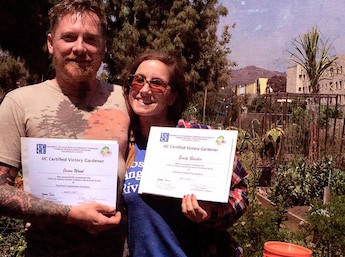
Jason Wood and Emily Gleicher run Farm LA, a Los Angeles-based non-profit that converts underutilized parcels of land into vibrant urban farms. Photo credit: Dan Fujiwara.
A mutual passion for gardening and supporting underserved communities were the motivations behind the conception of Farm LA, a Los Angeles-based non-profit organization geared toward converting dilapidated and underutilized parcels of land for urban farming.
Emily Gleicher, a freelance producer for design and animation projects, and Jason Wood, a former commercial diver who now works as an electrician and framer in construction, founded Farm LA after a non-traditional gift sparked their interests.
“For Valentine’s Day, Jay found these lima bean plants at CVS that sprout out and say ‘I Love You,’” says Gleicher. “We had already become very passionate about gardening… so the lima beans took off, and we all of a sudden had lima bean plants all over our house. That is where our love for gardening and lima beans started.”Soon after, the young couple started looking at properties around Los Angeles for fun in the event they decided to build a small house somewhere. Read More

